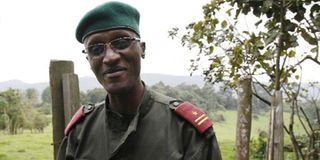Talk or I restart war, Congo rebel tells government

Gen Nkunda
KIROLIRWE, Congo, Tuesday (Reuters) - Congolese rebel leader Laurent Nkunda threatened today to take his eastern guerrilla war westwards to the capital Kinshasa unless the government agreed to talks on the country's future.
Defiant in the face of international moves to end the conflict in east Democratic Republic of Congo, Nkunda rejected complaints by human rights groups against him, saying he "didn't give a damn" about the International Criminal Court (ICC).
"I've done no wrong to my people ... nobody can reproach me for anything," the slim, bespectacled rebel chief said in an interview at his hilltop headquarters in North Kivu province.
Nkunda, who belongs to and defends Congo's Tutsi minority but also demands a better government for the whole country, last week halted a major advance towards North Kivu's provincial capital Goma that displaced tens of thousands of civilians.
The United Nations and foreign aid groups are now scrambling to address a humanitarian emergency described as "catastrophic" by relief workers in a country where more than five million people have died in a decade from conflict, hunger and disease.
Wearing a green beret and beige camouflage uniform and carrying a cane topped with a silver eagle's head, Nkunda said that if his offer of talks was not accepted by President Joseph Kabila, he would end a ceasefire in North Kivu.
"If they refuse to negotiate, it will mean they will be ready to only fight and we will fight them because we have to fight for our freedom," Nkunda said, surrounded by verdant hills that have earned North Kivu the name "Africa's Switzerland".
The atmosphere there was peaceful, in sharp contrast to the anguish and suffering of refugees packed into camps around Goma, who are clamouring for food and protection from violence.
The renegade former army general, who commands a 4,000-strong guerrilla army, said his next offensive would not stop at Goma, where U.N. peacekeepers have reinforced their positions, but would aim for Kinshasa, the national capital well over 1,500 km (950 miles) to the west.
"Goma is just a place to pass through ... When they force us to come down to Goma we won't stop there," he said.
Congo's government has refused to negotiate with Nkunda since his most recent offensive and has accused neighbouring Rwanda of backing him, a charge denied by Kigali.
"I'm not from Rwanda and I claim nothing for Rwanda," said Nkunda, who led his rebel cabinet in a prayer before a meeting.
UN peacekeepers have strengthened their positions around Goma but say their 17,000-strong force in Congo, the world's largest peace mission, is badly stretched across a country the size of Western Europe, where violent armed groups abound.
International efforts are underway try to arrange a peace summit between Congo and Rwanda and to solve the humanitarian emergency in the east of the former Belgian colony, which has rich reserves of copper, cobalt and gold.
Economic risks
Since 2006 elections that returned Kabila to power, hopes rose that the vast central African nation had finally left behind the 1998-2003 war that left the economy in ruins.
Investor interest in Congo's mineral treasure trove has risen in the last two years. But Central Bank Governor Jean-Claude Masangu said on Tuesday weak demand for metals in the global financial crisis will push economic growth below 10 percent next year and force a scaling back of mining projects.
Masangu listed the humanitarian crisis in the east, and the pressures of military spending, as economic risks.
Rebel chief Nkunda said the negotiations he sought with the government should focus on "good governance and security".
"To become head of state is not my ambition," he said.
Rights groups accuse his rebels of recruiting child soldiers and the ICC has issued a warrant for one of his commanders.
Nkunda backed the idea of a peace summit between Kabila and Rwandan President Paul Kagame, but said this could not be expected to solve east Congo's conflict, which nevertheless traces its origins back to the 1994 genocide in Rwanda.
"There is an internal problem, which has to have an internal solution," Nkunda said.
At the Mugunga refugee camp outside Goma, the head of the U.N. Congo mission, Alan Doss, was mobbed by ragged children with swollen bellies calling for food handouts.
Doss said his U.N. force, known as MONUC, which faces calls to be tougher with Nkunda's rebels, had brought in more troops to Goma from other parts of the country. "But we're robbing Peter to pay Paul, MONUC is thinly stretched," he told Reuters.
Although U.N. Secretary-General Ban Ki-moon is backing what he calls a U.N. "thin blue line against the chaos" in east Congo, a request to the Security Council for urgent reinforcements for the U.N. force has not been immediately met.




